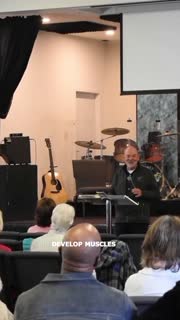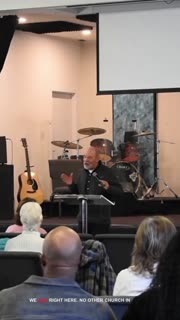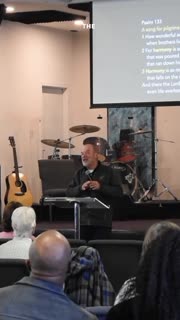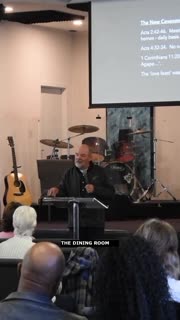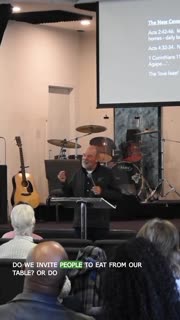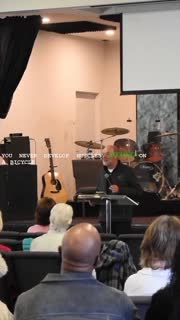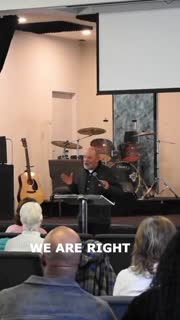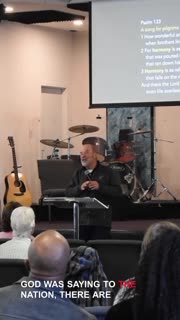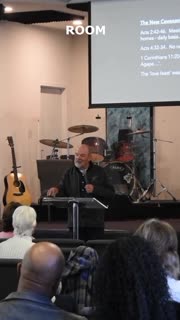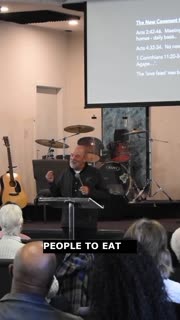Feasting Together: Building Community Through Shared Meals
Devotional
Sermon Summary
Bible Study Guide
Sermon Clips
### Quotes for Outreach
1. "You only develop muscles when you actually have to work and push yourself uphill. And faith is a little bit like that. There are times we've just got to get ourselves into gear and we've got to activate our spirit within us, stir up our hearts and say, Come on. Come on, soul. Why are you downcast? Hope in God." [44:28] (20 seconds)
2. "We are right here. No other church in Tauranga has a passion for Gate Power in the way that we do. We are right here. Now you might not live here. That's cool. Wherever you live, wherever you work, that is your Jerusalem. But when we as a church work as a team and do something coordinated we always centre it right here in the Gate Power, Maryvale, Grierton, Central South Avenues part of the city." [47:15] (25 seconds)
3. "God was saying to the nation, there are times I want to flatten, just completely flatten the socio-economic cultural differences and put everybody on the same platform. So I want to say this is one of the reasons I love our church being a church with multiple cultures because every now and then we just get to completely demolish some of those differences and just celebrate. We are brothers and sisters in Christ." [01:07:44] (24 seconds)
4. "The dining room table is the most powerful discipleship tool, Mum and Dad, that you have in your home. On your knees by the bed when you put your kids to bed, around the table at dinner time, you get to talk to your kids, you get to find out how the day went, you get to hear their challenges, you get to find out what they're wrestling with, and then they'll pour out their heart to you at night when you tuck them into bed and pray for them." [01:22:39] (23 seconds)
5. "Do we invite people to eat from our table? Or do we invite people to eat at our table? I want us to be at the table, people. I want us to be a church where no one can walk in and not be greeted. I want us to be a church where every person finds at least a small a table of 4 or 6 people where you know your heart can be shared. You know the burdens that you carry. You know that there are people who actually pray for you. Actually pray for you." [01:24:16] (33 seconds)
### Quotes for Members
1. "You never develop muscles sitting on a bicycle seat cruising downhill. You only develop muscles when you actually have to work and push yourself uphill. And faith is a little bit like that. There are times we've just got to get ourselves into gear and we've got to activate our spirit within us, stir up our hearts and say, Come on. Come on, soul. Why are you downcast? Hope in God." [44:28] (24 seconds)
2. "We are right here. No other church in Tauranga has a passion for Gate Power in the way that we do. We are right here. Now you might not live here. That's cool. Wherever you live, wherever you work, that is your Jerusalem. But when we as a church work as a team and do something coordinated we always centre it right here in the Gate Power, Maryvale, Grierton, Central South Avenues part of the city." [47:15] (25 seconds)
3. "God was saying to the nation, there are times I want to flatten, just completely flatten the socio-economic cultural differences and put everybody on the same platform. So I want to say this is one of the reasons I love our church being a church with multiple cultures because every now and then we just get to completely demolish some of those differences and just celebrate. We are brothers and sisters in Christ." [01:07:44] (24 seconds)
4. "The dining room table is the most powerful discipleship tool, Mum and Dad, that you have in your home. On your knees by the bed when you put your kids to bed, around the table at dinner time, you get to talk to your kids, you get to find out how the day went, you get to hear their challenges, you get to find out what they're wrestling with, and then they'll pour out their heart to you at night when you tuck them into bed and pray for them." [01:22:39] (23 seconds)
5. "Do we invite people to eat from our table? Or do we invite people to eat at our table? I want us to be at the table, people. I want us to be a church where no one can walk in and not be greeted. I want us to be a church where every person finds at least a small a table of 4 or 6 people where you know your heart can be shared. You know the burdens that you carry. You know that there are people who actually pray for you. Actually pray for you." [01:24:16] (33 seconds)
Ask a question about this sermon
1. "You only develop muscles when you actually have to work and push yourself uphill. And faith is a little bit like that. There are times we've just got to get ourselves into gear and we've got to activate our spirit within us, stir up our hearts and say, Come on. Come on, soul. Why are you downcast? Hope in God." [44:28] (20 seconds)
2. "We are right here. No other church in Tauranga has a passion for Gate Power in the way that we do. We are right here. Now you might not live here. That's cool. Wherever you live, wherever you work, that is your Jerusalem. But when we as a church work as a team and do something coordinated we always centre it right here in the Gate Power, Maryvale, Grierton, Central South Avenues part of the city." [47:15] (25 seconds)
3. "God was saying to the nation, there are times I want to flatten, just completely flatten the socio-economic cultural differences and put everybody on the same platform. So I want to say this is one of the reasons I love our church being a church with multiple cultures because every now and then we just get to completely demolish some of those differences and just celebrate. We are brothers and sisters in Christ." [01:07:44] (24 seconds)
4. "The dining room table is the most powerful discipleship tool, Mum and Dad, that you have in your home. On your knees by the bed when you put your kids to bed, around the table at dinner time, you get to talk to your kids, you get to find out how the day went, you get to hear their challenges, you get to find out what they're wrestling with, and then they'll pour out their heart to you at night when you tuck them into bed and pray for them." [01:22:39] (23 seconds)
5. "Do we invite people to eat from our table? Or do we invite people to eat at our table? I want us to be at the table, people. I want us to be a church where no one can walk in and not be greeted. I want us to be a church where every person finds at least a small a table of 4 or 6 people where you know your heart can be shared. You know the burdens that you carry. You know that there are people who actually pray for you. Actually pray for you." [01:24:16] (33 seconds)
### Quotes for Members
1. "You never develop muscles sitting on a bicycle seat cruising downhill. You only develop muscles when you actually have to work and push yourself uphill. And faith is a little bit like that. There are times we've just got to get ourselves into gear and we've got to activate our spirit within us, stir up our hearts and say, Come on. Come on, soul. Why are you downcast? Hope in God." [44:28] (24 seconds)
2. "We are right here. No other church in Tauranga has a passion for Gate Power in the way that we do. We are right here. Now you might not live here. That's cool. Wherever you live, wherever you work, that is your Jerusalem. But when we as a church work as a team and do something coordinated we always centre it right here in the Gate Power, Maryvale, Grierton, Central South Avenues part of the city." [47:15] (25 seconds)
3. "God was saying to the nation, there are times I want to flatten, just completely flatten the socio-economic cultural differences and put everybody on the same platform. So I want to say this is one of the reasons I love our church being a church with multiple cultures because every now and then we just get to completely demolish some of those differences and just celebrate. We are brothers and sisters in Christ." [01:07:44] (24 seconds)
4. "The dining room table is the most powerful discipleship tool, Mum and Dad, that you have in your home. On your knees by the bed when you put your kids to bed, around the table at dinner time, you get to talk to your kids, you get to find out how the day went, you get to hear their challenges, you get to find out what they're wrestling with, and then they'll pour out their heart to you at night when you tuck them into bed and pray for them." [01:22:39] (23 seconds)
5. "Do we invite people to eat from our table? Or do we invite people to eat at our table? I want us to be at the table, people. I want us to be a church where no one can walk in and not be greeted. I want us to be a church where every person finds at least a small a table of 4 or 6 people where you know your heart can be shared. You know the burdens that you carry. You know that there are people who actually pray for you. Actually pray for you." [01:24:16] (33 seconds)
